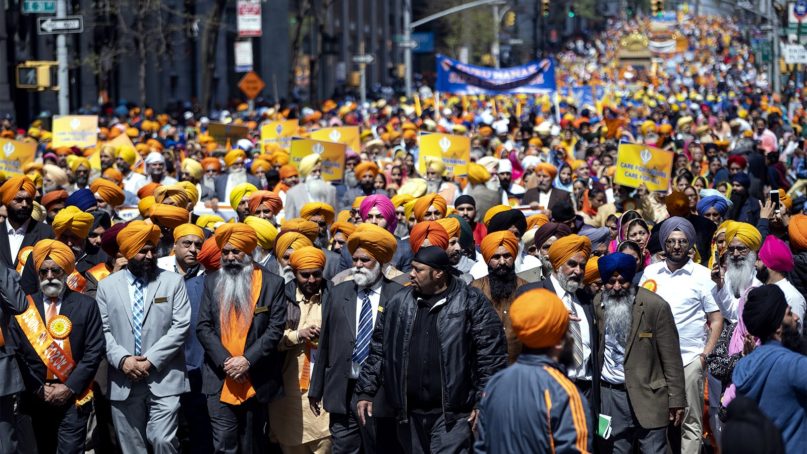(RNS) — When Hurricane Katrina struck my hometown of New Orleans in 2005, I was tasked with leading a major Muslim relief effort. While Katrina brought many sights I won’t forget, one of the most enduring and treasured was members of United Sikhs, a humanitarian and civil rights nonprofit, bolting this way and that across the floor of the Superdome, which had been turned into a massive shelter, assisting distressed people with a zeal unlike anything I’d ever seen before.
This despite the fact that the Sikh community in New Orleans is minimal, and I can’t recall seeing a single Sikh Katrina victim in any of the shelters.
In fact the Sikhs, though they are the fifth largest faith group in the world, number only a few hundred thousand members in the entire U.S., most of whom live around New York City and in California. But in this rising climate of xenophobia, especially Islamophobia, they have become easy targets. Bigots often mistake Sikhs for Muslims due to their highly visible turbans, beards and scarves.
Despite the real harm this has caused Sikhs, they have consistently refused to throw the Muslim community under the bus by simply distancing themselves from Islam.
You may have seen the video of Canadian New Democratic Party leader Jagmeet Singh, a candidate for prime minister, being heckled by a protester in 2017 for trying to “push Shariah” and being in “bed with the Muslim Brotherhood.” His brother, Gurratan Singh, also a member of Parliament, went viral last month for how he handled an Islamophobic heckler outside a Muslim convention.
Gurratan tweeted afterward, “I will never respond to an Islamophobe by stating, ‘I am not a Muslim.’”
Instead of protecting themselves, Sikhs have never shied away from their mandate to service and solidarity with others.

This photo provided by Harris County Sheriff’s Office shows Deputy Sandeep Dhaliwal. Dhaliwal, who was slain on Sept. 27, 2019, was the first Sikh deputy on the force. (Harris County Sheriff’s Office via AP)
The slaying of Deputy Sandeep Singh Dhaliwal in Houston last month reinforced the cost of how Sikhs choose to deal with their impossible situation. Dhaliwal actively assisted in disaster relief efforts to communities affected by Hurricanes Harvey and Maria, worked with at-risk communities in Houston and was a source of comfort to his hometown of Punjab, in northern India, where he helped coordinate drought relief efforts. He was an ideal citizen and a source of pride for his community.
But as he navigated the streets of Texas with or without his uniform, most people, including the man who is accused of killing him, probably saw nothing more than his skin color, turban and beard. No matter how American Dhaliwal was on paper, and how remarkable of a human being he was in action, his appearance rendered him conclusively foreign. This not only diminishes the contributions of Sikhs, but our own behavior when tragedies strike them.
These tragedies far outpace their numbers. Sikhs have borne the brunt of Islamophobia since the immediate aftermath of 9/11. Just four days after the terrorist attacks, Balbir Singh Sodhi was murdered outside of his business in Arizona by a man who wanted to go out and “shoot some towel-heads” in retaliation.
When we think of attacks on houses of worship, we often think of synagogues, mosques and black churches that have been targeted recently by white supremacist terrorist attacks. But before these attacks became a hallmark of this decade, we witnessed the horrible tragedy at Oak Creek, Wisconsin, where six Sikhs were murdered in their temple in 2012.
Muslims owe the Sikhs thanks for this unwavering and inspiring steadfastness in the face of Islamophobia. And as you grieve over the loss of Deputy Sandeep Singh Dhaliwal, we grieve with you.
As an American Muslim who wears a kufi and a beard, I want to take this occasion to say thank you to the Sikh community. Thank you for the constant solidarity you show to my community, and the constant service you render to our country. Your community is too often underrepresented in the discussion of fatal bigotry, uncared for in its grief and unappreciated for its service and solidarity.
(Imam Omar Suleiman, an American Muslim scholar, activist and civil rights leader, is founder and president of the Yaqeen Institute for Islamic Research and an adjunct professor of Islamic studies in the graduate liberal studies program at Southern Methodist University. The views expressed in this commentary do not necessarily represent those of Religion News Service.)





